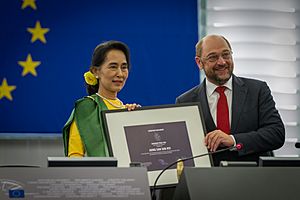Sakharov Prize facts for kids
The Sakharov Prize for Freedom of Thought, commonly known as the Sakharov Prize, is an honorary award for individuals or groups who have dedicated their lives to the defence of human rights and freedom of thought. Named after Russian scientist and dissident Andrei Sakharov, the prize was established in December 1988 by the European Parliament.
A shortlist of nominees is drawn up annually by the European Parliament's Committee on Foreign Affairs and Committee on Development. The MEPs who make up those committees then select a shortlist in September. Thereafter, the final choice is given to The European Parliament's Conference of Presidents (President and political group's leaders) and the laureate's name is announced late in October. The prize is awarded in a ceremony at the Parliament's Strasbourg hemicycle (round chamber) in December. The prize includes a monetary award of €50,000.
The first prize was awarded jointly to South African Nelson Mandela and Russian Anatoly Marchenko. The 1990 award was given to Aung San Suu Kyi, but she could not receive it until 2013 as a result of her political imprisonment in Burma. The prize has also been awarded to organisations, the first being the Argentine Mothers of the Plaza de Mayo in 1992. Five Sakharov laureates were subsequently awarded the Nobel Peace Prize: Nelson Mandela, Aung San Suu Kyi, Malala Yousafzai, Denis Mukwege and Nadia Murad.
Razan Zaitouneh (2011) was kidnapped in 2013 and is still missing. Nasrin Sotoudeh (2012) was released from prison in September 2013, but is still barred from leaving Iran, along with fellow 2012 laureate Jafar Panahi. The 2017 prize was awarded to the Democratic Opposition in Venezuela, under boycott of the European United Left–Nordic Green Left.
Laureates
| Indicates a posthumous award |
| Year | Image | Recipient | Nationality | Notes | Reference |
|---|---|---|---|---|---|
| 1988 | 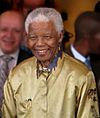 |
Nelson Mandela | Anti-apartheid activist and later first President of South Africa | ||
| Anatoly Marchenko |
Soviet dissident, author, and human rights activist | ||||
| 1989 | 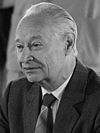 |
Alexander Dubček | Slovak politician, attempted to reform the communist regime during the Prague Spring | ||
| 1990 | 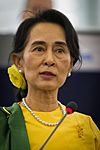 |
Aung San Suu Kyi | At the time she received the award, Suu Kyi was an opposition politician and a former General Secretary of the National League for Democracy, known for her peaceful struggle against military rule in Myanmar. She personally accepted the award in 2013, after she was released from 15 years of house arrest. In 2020, the Conference of Presidents of the European Parliament formally suspended Suu Kyi from the Sakharov Prize Community due to her role in the atrocities against the Rohingya people, but did not revoke the prize itself. | ||
| 1991 |
|
Adem Demaçi | Kosovo Albanian politician and long-term political prisoner | ||
| 1992 |  |
Mothers of the Plaza de Mayo | Association of Argentine mothers whose children disappeared during the Dirty War | ||
| 1993 | Oslobođenje | Popular newspaper that defended Bosnia and Herzegovina as a multi-ethnic state | |||
| 1994 | 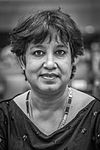 |
Taslima Nasrin | Feminist author and former doctor | ||
| 1995 | 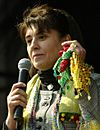 |
Leyla Zana | Politician of Kurdish descent from Southeastern Turkey, who was imprisoned for 15 years for being a member of the PKK | ||
| 1996 | 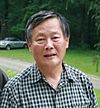 |
Wei Jingsheng | Activist in the Chinese democracy movement | ||
| 1997 | 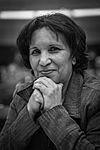 |
Salima Ghezali | Journalist and writer, activist for women's rights, human rights, and democracy in Algeria | ||
| 1998 | 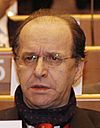 |
Ibrahim Rugova | Kosovo Albanian politician and first President of Kosovo | ||
| 1999 | 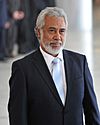 |
Xanana Gusmão | Former militant and later first President of East Timor | ||
| 2000 |
|
¡Basta Ya! | Organisation uniting individuals of various political positions against terrorism | ||
| 2001 |  |
Nurit Peled-Elhanan | Peace activist | ||
| Izzat Ghazzawi | Writer and professor | ||||
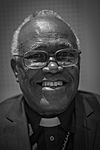 |
Dom Zacarias Kamwenho | Archbishop and peace activist | |||
| 2002 | Oswaldo Payá | Political activist and dissident | |||
| 2003 | 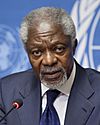 |
Kofi Annan | Nobel Peace Prize recipient and seventh Secretary-General of the United Nations | ||
 |
United Nations | International | |||
| 2004 |
|
Belarusian Association of Journalists | Non-governmental organisation "aiming to ensure freedom of speech and rights of receiving and distributing information and promoting professional standards of journalism" | ||
| 2005 |  |
Ladies in White | Opposition movement, relatives of jailed dissidents | ||
| Reporters Without Borders | International | France-based non-governmental organisation advocating freedom of the press | |||
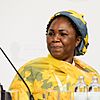 |
Hauwa Ibrahim | Human rights lawyer | |||
| 2006 | 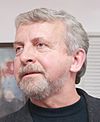 |
Alaksandar Milinkievič | Politician chosen by United Democratic Forces of Belarus as the joint candidate of the opposition in the 2006 presidential election | ||
| 2007 | 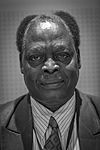 |
Salih Mahmoud Osman | Human rights lawyer | ||
| 2008 |  |
Hu Jia | Activist and dissident | ||
| 2009 |
|
Memorial | International civil rights and historical society | ||
| 2010 | 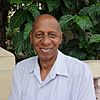 |
Guillermo Fariñas | Doctor, journalist, and political dissident | ||
| 2011 | 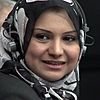 |
Asmaa Mahfouz | Five representatives of the Arab people, in recognition and support of their drive for freedom and human rights | ||
 |
Ahmed al-Senussi | ||||
 |
Razan Zaitouneh | ||||
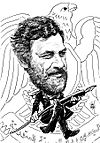 |
Ali Farzat | ||||
| Mohamed Bouazizi |
|||||
| 2012 | 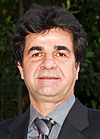 |
Jafar Panahi | Iranian activists, Sotoudeh is a lawyer and Panahi is a film director. | ||
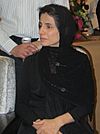 |
Nasrin Sotoudeh | ||||
| 2013 | 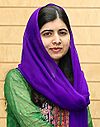 |
Malala Yousafzai | Campaigner for women's rights and education | ||
| 2014 | 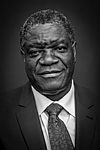 |
Denis Mukwege | Gynecologist | ||
| 2015 | 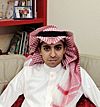 |
Raif Badawi | Saudi Arabian writer, activist, and the creator of the website Free Saudi Liberals | ||
| 2016 | 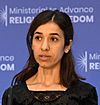 |
Nadia Murad | Yazidi human rights activists and former abductees of the Islamic State of Iraq and the Levant | ||
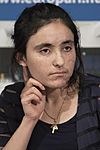 |
Lamiya Aji Bashar | ||||
| 2017 | 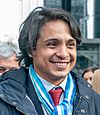 |
Democratic opposition in Venezuela | Members of the country's National Assembly and all political prisoners as listed by Foro Penal Venezolano represented by Leopoldo López, Julio Borges, Antonio Ledezma, Daniel Ceballos, Yon Goicoechea, Lorent Saleh, Alfredo Ramos and Andrea González. The award was seen as rewarding the "courage of student activists and protesters in face of repression by Nicolas Maduro's government" and boycotted by the European United Left–Nordic Green Left parliamentary group. | ||
| 2018 | 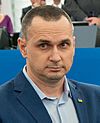 |
Oleg Sentsov | Film director, symbol of the struggle for the release of political prisoners held in Russia and around the world | ||
| 2019 | 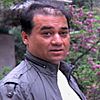 |
Ilham Tohti | Uyghur economist, scholar, and human rights activist | ||
| 2020 | 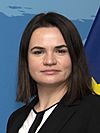 |
Democratic opposition in Belarus | Democratic opposition of Belarus represented by the Coordination Council, an initiative of Sviatlana Tsikhanouskaya, Svetlana Alexievich, Maria Kalesnikava, Volha Kavalkova and Veranika Tsapkala, and political and civil society figures - Siarhei Tsikhanouski, Ales Bialiatski, Sergei Dylevsky, Stsiapan Putsila and Mikola Statkevich. | ||
| 2021 | 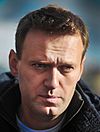 |
Alexei Navalny | Opposition politician and anti-corruption activist | ||
| 2022 |  |
The Ukrainian people | Awarded to Ukrainians who are "protecting democracy, freedom and rule of law" following the 2022 Russian invasion of Ukraine. | ||
| 2023 |  |
Mahsa Jina Amini |
Mahsa Amini's death under suspicious circumstances led to widespread protests, often under the slogan Woman, Life, Freedom. | ||
 |
Woman, Life, Freedom movement | ||||
| 2024 |  |
María Corina Machado | Opposition politicians | ||
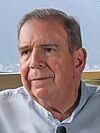 |
Edmundo González |
See also
 In Spanish: Premio Sájarov para niños
In Spanish: Premio Sájarov para niños
- Nobel Peace Prize
- Gandhi Peace Prize
- Mosaddegh Prize


